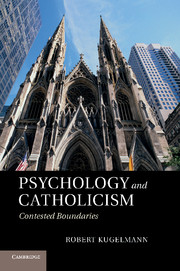Book contents
- Frontmatter
- Contents
- Acknowledgments
- 1 An introduction
- 2 The major fault line: modernism and psychology
- 3 Neoscholastic psychology
- 4 Psychology as the boundary: Catholicism, spiritualism, and science
- 5 Psychoanalysis versus the power of will
- 6 From out of the depths: Carl Jung's challenges and Catholic replies
- 7 Institutionalizing the relationship
- 8 Humanistic psychology and Catholicism: dialogue and confrontation
- 9 Trading zones between psychology and Catholicism
- 10 Crossings
- References
- Index
3 - Neoscholastic psychology
Published online by Cambridge University Press: 05 July 2011
- Frontmatter
- Contents
- Acknowledgments
- 1 An introduction
- 2 The major fault line: modernism and psychology
- 3 Neoscholastic psychology
- 4 Psychology as the boundary: Catholicism, spiritualism, and science
- 5 Psychoanalysis versus the power of will
- 6 From out of the depths: Carl Jung's challenges and Catholic replies
- 7 Institutionalizing the relationship
- 8 Humanistic psychology and Catholicism: dialogue and confrontation
- 9 Trading zones between psychology and Catholicism
- 10 Crossings
- References
- Index
Summary
Vetera novis augere et perficere
Leo XIII, Aeterni Patris, 1879By the early twentieth century, psychology was securely a secular enterprise (Maier, 2004), even though this assessment was not universally affirmed, and even if this assessment did not necessarily carry modernist implications. As Wade E. Pickren (2000) observes, many early scientific psychologists sought to “make their case that they had something new to offer their audiences without its appearing to be a materialistic science, a psychology without a soul” (p. 1022). He writes that they did so often by portraying the new psychology as valid because it was scientific, and hence better than the old abstract theories (citing Edward A. Pace as an example) and useful in building character. Catholic psychologists, however, could not easily distance themselves from the old, philosophical psychology. They adopted a different strategy. In the Catholic world, moreover, psychology was a problematic development, because by its very name psychology was the science of the soul. How could Catholics participate in a secular science of the soul without crashing onto the rocks of materialism and modernism? Neoscholastic psychology was an answer.
When A. A. Roback (1952) included a chapter on “Neo-Scholastic psychology,” he was giving attention to something the larger psychological community had ignored. When he revised his book, he added “A puzzling attitude” to this chapter (Roback, 1964). The puzzling attitude belonged to Misiak and Staudt, who in Catholics in psychology (1954) objected to Catholic psychologists being considered a separate school.
- Type
- Chapter
- Information
- Psychology and CatholicismContested Boundaries, pp. 66 - 118Publisher: Cambridge University PressPrint publication year: 2011



